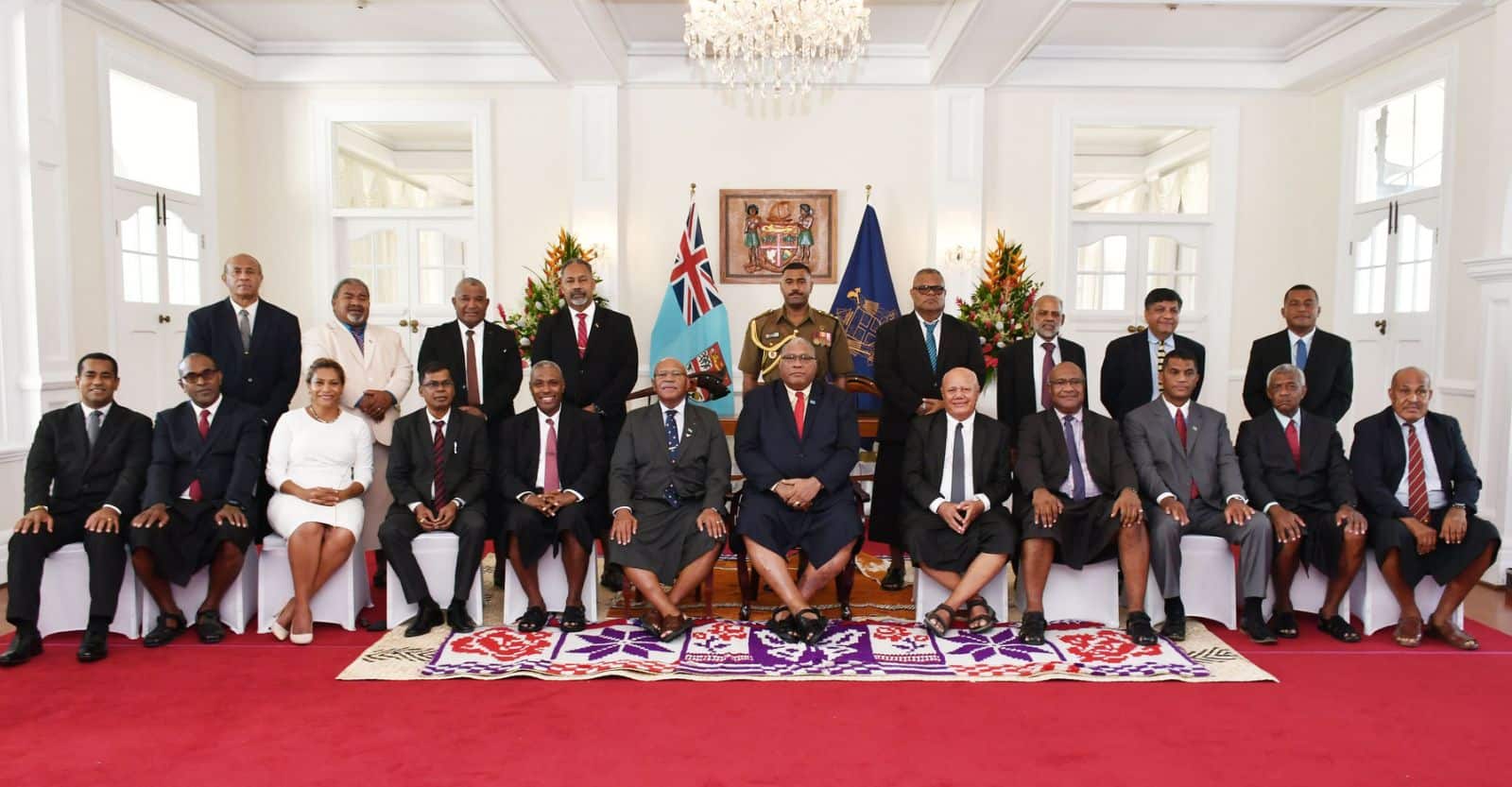Sitiveni Rabuka is Fiji’s prime minister again after assembling last month a coalition with a majority of three seats, ending Frank Bainimarama’s 16 years in power.
Like Gaul, the new coalition government of Fiji is divided into three parts. The challenge for the coalition is to make a whole of its three parts. Rabuka’s People’s Alliance, although a new party, is the largest in the coalition with 21 seats in the 55-member parliament. Rabuka had previously been leader of the Social Democratic Liberal Party. When he lost the leadership of SODELPA, he set up the People’s Alliance (PA), taking a major share of his old party – candidates and base – with him.
The National Federation Party (NFP) is the second largest in the coalition with five seats. It’s the oldest party, having been in existence since before independence. Until recently, its base was very strongly located in the Indo-Fijian community. But this was significantly expanded for the 2022 election with the addition of high-profile iTaukei (indigenous Fijian) candidates such as Pio Tikoduadua.
SODELPA, the Christian-based and anti-China party, is the smallest member of the coalition with three seats. However, it was the kingmaker. Its decision to back the PA-NFP in parliament denied FijiFirst the numbers to continue in office as it has since the restoration of democracy in 2014.
Despite legal moves to challenge SODELPA’s decision to join the PA-NFP coalition, the SODELPA management committee persisted with its choice to back the PA-NFP, helped by some effective old-fashioned political horse trading on the spoils of victory.
When military chief Jone Kalouniwai refused to intervene, President Wiliame Katonivere had little choice but to commission Rabuka as PM.
The durability of the new government is likely to be tested regularly as the coalition attempts to reconcile differing, and sometimes conflicting, mandates. They will also have to address various grievances amongst themselves as well as with the Bainimarama legacy, all the while managing with a large cohort of inexperienced MPs.
Rabuka has gone to considerable lengths to ensure coalition cohesion. He appointed three deputy prime ministers, one from each coalition partner. In addition, every coalition MP has been given an executive stake in the government’s survival. There are 19 ministers and 10 assistant ministers in the Rabuka coalition government. There’s no backbench.
The vote for a new Speaker exposed a potential problem. If this had gone straight down party lines, it would have been resolved 29-26 in favour of Naiqama Lalabalavu who had been nominated by NFP leader Biman Prasad. Instead, there was a 28-27 vote. The defector in the secret ballot could have been from any coalition party. But given the very closely contested vote within the SODELPA management committee and the antipathy to Rabuka, the rebel probably came from SODELPA’s ranks.
This is the third peaceful transfer of power since Fiji’s independence in 1970. The first was on April 13, 1987 when Timoci Bavadra was installed as prime minister of a Labour-NFP coalition replacing Fiji’s first prime minister, Kamisese Mara. A month later Bavadra was deposed by Rabuka’s first coup.
The second transfer of power occurred on May 19, 1999. Mahendra Chaudhry defeated Rabuka who had won the premiership in two successive elections. Chaudhry was ousted a year later by George Speight’s hybrid civilian-military coup.
This record shows why there’s a natural degree of nervousness about any non-parliamentary attempt to reverse the vote, even if the coalition itself proves stable.
Home Affairs Minister Pio Tikoduadua has requested the resignation of Police Commissioner Sitiveni Qiliho for his role trying to fabricate ethnic tensions after the December 14 election in order to call on the military for support. He’s also asked Major General Kalouniwai to ensure all guns and ammunition are returned to the armoury and accounted for. That’s to rein in the capacity of defence personnel to carry weapons outside their official duties. These duties don’t include civilian law enforcement.
While it’s up to Rabuka and his coalition partners to hold together to maintain a lasting and productive government, there’s a role for Australia in supporting the new administration as it finds its feet and attempts to deliver on electoral promises. Anthony Albanese has already congratulated Rabuka on his election win. Fiji’s new leader has said he wants the two countries to be seen as “equal partners in the Pacific”. But Rabuka has also been saying for some time that Fiji shouldn’t be too close to China and should strengthen bonds with Australia, New Zealand and the US.
Australia and Fiji concluded a status of forces agreement last October to make it easier for each country’s defence forces to operate with the other. Both states and have been redeveloping a disaster and humanitarian relief centre at Blackrock Camp for the Fijian defence forces.
For Fiji to remain a regional powerbroker at a time when there’s increased geopolitical competition in the Pacific, it’s necessary that the Rabuka government be stable and effective. It will be important that Canberra backs it by demonstrating confidence in the new government. This peaceful, democratic transfer of power in Fiji needs to be durable.
Richard Herr is a former director of the Centre for International and Regional Affairs, University of Fiji and author of Chinese Influence in the Pacific Islands. Anthony Bergin is a senior fellow at the Australian Strategic Policy Institute. A version of this article appeared in The Australian.
The opinions expressed in this article are those of the authors and do not necessarily reflect the opinions of this publication.
